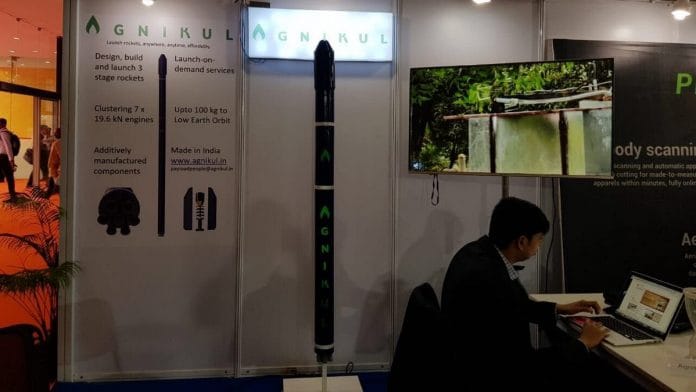New Delhi: India has increasingly shown its prowess in space technology in the past few years with various innovations. Of late, there has also been a wave of space start-ups that makes smaller satellites and communications systems. One such is the Agnikul Cosmos, an IIT-Madras incubated company, which is planning to offer people a chance to send ashes of their loved ones to space for a little over $2,000.
The firm says it wants to make space travel as routine and affordable as “going to the Sunday market”.
Agnikul is making a small rocket that can carry a payload of around 200 kg.
“If a company provides the satellite to carry the ashes, we can give the rocket,” said Srinath Ravichandran, co-founder and CEO of Agnikul.
“As of now, transporting items to the outer space is a big deal,” explained Ravichandran.
Agnikul was founded in December 2017 by 34-year-old Ravichandran, who studied and worked in the US before heading back to India.
Commercialisation of space
In the past several years, global space start-ups have been doing various activities, both for science and adventure. Elon Musk’s SpaceX has launched a full-blown Tesla Roadster into orbit around the Sun and US-based Rocket Labs launched a disco ball-like sphere into orbit so it can be seen brightly from the Earth.
Japanese firm ALE is working on space ‘fireworks’: its micro-satellite will gradually release minute particles 400 km above Earth that will burn brightly as it hurtles towards the planet and disintegrate 60km before hitting the ground. Some firms have also been trying to store data in low orbiting satellites.
Malaysian aerospace company Independence-X has sent a letter of interest to Agnikul for its rocket services. Independence-X wants to perform protein crystallisation in space — a method used for studying protein structures. Ravichandran said the company wants to launch 15-20 satellites in the coming years.
A booming rocket industry
Making and launching rockets is slowly turning into a lucrative industry, with estimates saying the Satellite Launch Vehicle (SLV) market will cross 2.4 billion by 2024. These rockets come in all shapes and sizes and are capable of launching both within the atmosphere and in the Earth’s orbit.
Smaller rockets, such as the one that Agnikul is working on, has been gaining a fair amount of interest from investors too.
US-based small rocket builder Vector raised $70 million from investors such as Morgan Stanley in October 2018 while Bangalore-based Bellatrix Aerospace raised $3 million in June 2019.
Agnikul too raised Rs 3 crore in funding from Speciale Invest in February 2019.
Also read: How ISRO can help satellite launch startups tap a billion-dollar (and growing) market
Working in India
While working in the US, in early 2016, Ravichandran got in touch a few IIT professors in Kanpur, Kharagpur, Delhi, Mumbai and Madras who were known for their aerospace programs and pitched his idea of making smaller rockets for commercial purposes.
“Nothing worked for a while. Either no one was interested or everyone was too busy,” he said.
It was S.R. Chakravarthy, an aerospace engineering professor at IIT-Madras, who finally showed interest in Ravichandran’s idea. Agnikul is now incubated at IIT-Madras’ National Center for Combustion Research and Development (NCCRD), with advisors such as former ISRO officer and Padma Bhushan winner R.V. Perumal.
Today, it has a team of 40 members, including former interns of NASA and European Space Agency (ESA).
“Agnikul has the potential to be very successful. The team has been working with the right scientists,” said Chakravarthy.
The goal is to make smaller rockets and at an 80 per cent lower cost than bigger ones, said Ravichandran.
“You can’t replicate the design used for a large rocket. They are both modes of transportation but have different designs,” he explained.
It takes about four-five years and $10-15 million to make the first full-scale prototype of a small rocket, Ravichandran further said.
“So far, we have about two more years to complete the model. Agnikul hopes to launch its rocket in 2021. After the first model is built successfully, replicating it is likely to cost less than $1 million,” he added.
The bulk of their components are 3D printed, which aids in both accuracy of design and lowering costs. Building and testing of their prototypes is entirely done at NCCRD.
Lack of awareness
Team Agnikul is currently looking to raise funds to cover manufacturing costs but most Indian investors do not know enough about space start-ups. “We spoke with about 100 investors and each time we had to teach them,” Ravichandran said.
Yet another hurdle is lack of freedom for private players to enter the space business in India, which is reliant on ISRO. Ravichandran feels the latest glitch in Chandrayaan-2’s launch might put ISRO on a cautious foot. “This will definitely make ISRO more guarded about letting private companies perform space launches”.
Whatever it is, this space enthusiast only hopes ISRO’s glitches are not here to stay so Agnikul can launch its rockets soon.
Also read: India must boost start-ups to catch up with China’s private space firms







Bad idea! Wonder why no one has taken up the business of converting ashes to diamonds. Please check out https://www.lonite.com/cremation-ashes-into-diamonds/
Immense potential. Hope I am given the first complimentary conversion!